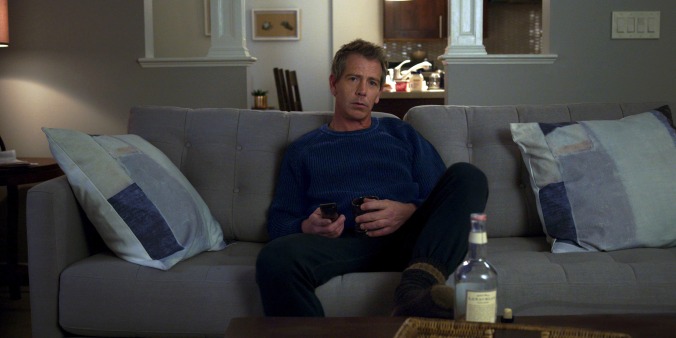Money, sex, marriage, death, and children. Those are the thorny topics writer-director Nicole Holofcener once claimed she could make at least 10 movies about. She’s one step closer to doing so with The Land Of Steady Habits—a Netflix original film enjoying a streaming debut just days after its world premiere at the Toronto International Film Festival. It’s Holofcener’s first feature since 2013’s Enough Said (she’s been working in TV in the interim) and her first without frequent collaborator Catherine Keener. Like most of Holofcener’s work, the film centers on the quiet, offbeat interpersonal dilemmas of affluent people. This time around, however, Holofcener swaps her usual female-centric perspective for a male-centric one. Adapted from Ted Thompson’s novel of the same name, The Land Of Steady Habits is a triptych of suburban ennui about three men at three very different stages in life. In the well-trod territory of fiction about rich men in self-induced emotional crises, the film stands as a worthy, if not exactly groundbreaking, addition.
Taking a break from his recent turns as blockbuster baddies, Ben Mendelsohn stars as Anders Hill, a recently divorced, recently retired financial executive whose attempts to escape a life of structured tedium have inadvertently led him down the overly familiar path of a midlife crisis. After years of building up a life of suburban comfort, Anders’ future is suddenly a blank slate—a prospect that’s not quite as invigorating as he expected it to be, especially as the Christmas season approaches. Elsewhere, Anders’ 27-year-old son, Preston (Thomas Mann), is struggling through the equally familiar beats of a post-college quarter-life crisis following a stint in rehab. Preston’s past troubles are mirrored in Charlie (Charlie Tahan), the disaffected, drug-addicted teenage son of a close family friend who’s certain that rehab is the worst punishment his parents could concoct for him.
As with most of Holofcener’s films, The Land Of Steady Habits is light on plot and heavy on incident. The film opens with the fantastic image of Anders perusing the colorful towel aisles of a mammoth Bed Bath & Beyond. “I’m looking for things to put on my shelves,” he later explains to one saleswoman before sweeping her off her feet with an enthusiasm he can’t quite match in bed. That funny, melancholy opening sequence sets a high-water mark the rest of the film never really equals. The first half, in particular, struggles to find a core around which to anchor its meandering exploration of the “money, sex, and marriage” of Holofcener’s thematic cocktail. Thankfully, the film is buoyed by its talented—if underutilized—ensemble, including Edie Falco as Anders’ ex-wife, Connie Britton as his potential love interest, and Elizabeth Marvel as Charlie’s mom. The actors breathe life into keenly observed moments of social awkwardness and unexpected connection. Mann and Tahan, especially, give wonderfully empathetic performances as highly intelligent young men who nevertheless just can’t quite get their lives together.
It’s Mendelsohn’s film, however, and The Land Of Steady Habits lives or dies by how engaging you find his understated performance. At his best, he imbues Anders with a sheepish, self-aware charm and dry sense of humor that softens his frequently selfish actions. At other times, Mendelsohn leans into Anders’ apathy to the point where his performance feels lethargic. The film is keenly aware of Anders’ aimlessness, which doesn’t necessarily make that aimlessness any more interesting to watch, and it struggles with that tonal line throughout. Production design meant to emphasize the catalog cleanliness of suburban Connecticut and its wealthy residents’ cookie-cutter homes sometimes inadvertently reads as Hallmark-channel hollowness.
The film finds new focus in its second half, as it shifts to a more pointed exploration of the difficulties of parenting and being parented. In one of its most moving and complex through-lines, Anders and Charlie strike up an odd friendship, and the choice of whether to treat Charlie as a friend to hang out with or a child to care for becomes central to Anders’ struggles with his identity. It’s just one of many parent/child relationships—both surrogate and biological—that the film explores with nuance and frankness. The Land Of Steady Habits has dark implications about the cyclical failures of family and community. Yet Holofcener ultimately finds hope in the idea that even the steadiest of habits can, in fact, be changed.


 Keep scrolling for more great stories from The A.V. Club.
Keep scrolling for more great stories from The A.V. Club.